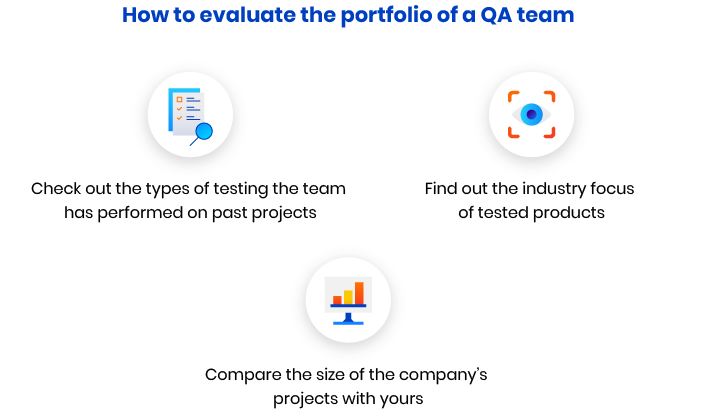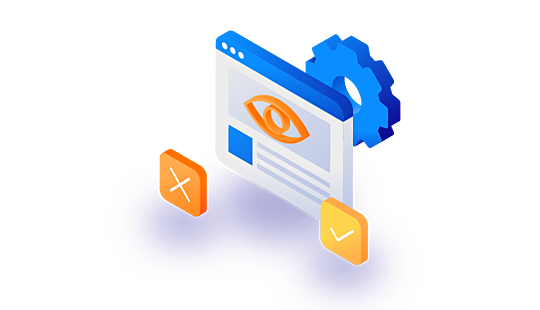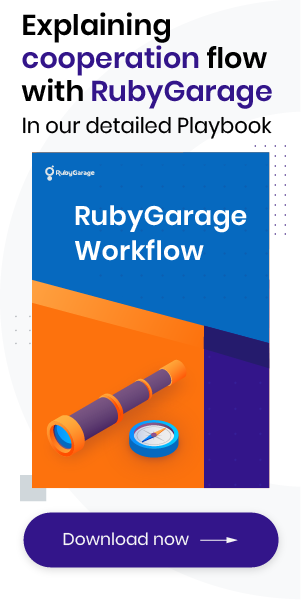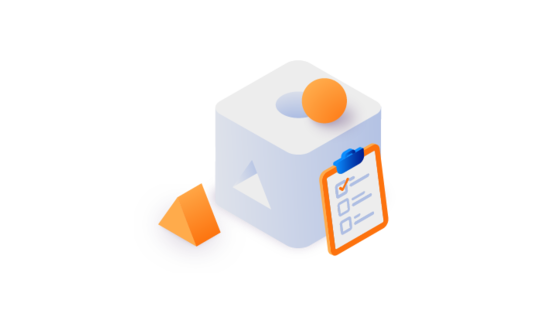-
Product Management
Software Testing
Technology Consulting
-
Multi-Vendor Marketplace
Online StoreCreate an online store with unique design and features at minimal cost using our MarketAge solutionCustom MarketplaceGet a unique, scalable, and cost-effective online marketplace with minimum time to marketTelemedicine SoftwareGet a cost-efficient, HIPAA-compliant telemedicine solution tailored to your facility's requirementsChat AppGet a customizable chat solution to connect users across multiple apps and platformsCustom Booking SystemImprove your business operations and expand to new markets with our appointment booking solutionVideo ConferencingAdjust our video conferencing solution for your business needsFor EnterpriseScale, automate, and improve business processes in your enterprise with our custom software solutionsFor StartupsTurn your startup ideas into viable, value-driven, and commercially successful software solutions -
-
- Case Studies
- Blog
How to Hire a QA Team for Your Project
No matter how much money you’ve spent developing your product, without proper quality assurance testing, it’s all in vain. A quality assurance (QA) check is vital if you want to create a smoothly working, sustainable, and high-quality product. However, choosing the right QA team is hard. If you don’t want to spend hours interviewing the wrong candidates, then this guide is for you. It will help you find and hire a QA team to check your project.
How to hire a QA team
The hiring process doesn’t consist solely of interviews. There are some vital things you need to do before and after you speak with a team. Let’s check how to prepare yourself for these steps.
What to do before an interview
Searching for candidates and preparing for an interview usually takes even longer than the interview itself. However, the right preparation will allow you to find a quality assurance team that’s the perfect fit for the job. So how to hire a QA team and what exactly do you need to check before you invite an external QA team to talk in person?
Read reviews
As 92 percent of B2B businesses always check a company’s reviews before contacting a potential partner, software development and quality assurance companies encourage their clients to leave feedback. Review platforms such as Clutch, GoodFirms, and G2 are the first places to go to find and hire great QA engineers. These websites are a great place to start your search and find out more about a company you like.
- Clutch is a platform where clients can rate and leave feedback about companies they’ve cooperated with. This platform is a helpful starting point for your search as it provides vendor rating lists by country, type of service, customer feedback, hourly rate, and more. Once you’ve narrowed your search to several potential vendors, you can check out companies’ pages to see the number of employees on a team, date of founding, industry focus, client focus (small/medium/enterprise), and reviews about the team. The peculiarity of Clutch is that it tries to verify every review before adding it to a company’s page.
- GoodFirms is a similar platform that has an abundance of search features and filters to help you find the team you need. GoodFirms also verifies customers’ feedback to provide you only with trustworthy information about companies and teams. The platform allows you to check a company’s hourly rate, size, location, and a full list of services provided.
- G2 is a relatively young platform that collects not only feedback about IT vendors but also about software tools and programs. On G2.com, you can find information about a company’s size, hourly rate, languages spoken, and client reviews. G2.com also allows vendors to create a community of supporters within the platform and discuss different topics there.
Check out websites and portfolios
A company’s website is the face you can judge it by. If the website works smoothly and the user interface and user experience are user-centric, it means the company pays a great deal of attention to details.
The next step in your investigation is to check out a company’s portfolio. Here are the things to pay attention to while choosing QA specialists and reviewing their portfolios:

- Check out the types of testing the team has performed on past projects. It’s important not only to find out what types of testing a team can provide in general but also to understand what checks the team has performed on specific projects. For instance, all medical products for the US market have to be checked for HIPAA compliance, whereas all healthcare apps in Canada have to be tested on PIPEDA compliance. It’s likely your product also requires some specific types of testing. A company’s portfolio can show you what approach the team applies in each particular case.
- Find out the industry focus of tested products. The quality assurance team you hire needs to be experienced in testing apps or websites similar to yours. If they’ve never tested an augmented reality (AR) or blockchain-based product, they’ll need more time to learn how to work with one.
- Compare the size of the company’s projects with yours. The size of the project also matters a lot. If a QA team has worked only on small short-term projects, it may not be ready to step up on a large project and test it comprehensively.
Sign a non-disclosure agreement with each team member
It may seem that a non-disclosure agreement (NDA) is only required for banking or military projects. However, experience shows that every startup idea needs sufficient protection. If you want to protect your business idea from being copied, you can ask every member of your external QA team to sign an NDA before you even start negotiations. Let’s take a look at the benefits you get by signing an NDA:
- Protection of your intellectual property. The most significant advantage of an NDA is not just securing your business idea but also all the important information about your project. Signing an NDA can grant you peace of mind by ensuring that all your confidential data is protected.
- Data protection after product release. A standard NDA protects your product and all confidential data for two years after you’ve finished your cooperation with a quality assurance team. However, you can extend this period if necessary.
- Clearly defined consequences in case of breach of agreement. An NDA also prescribes consequences for each party in case of data leaks or breaches of the agreement. Thus, you can know what measures you can take against your contractor in case they break the agreement.
What to check during an interview
When you find a team, you can proceed to the interview stage. Below are some key aspects to discuss when hiring a QA company for your project.
#1 Testing standards the team follows
The quality assurance process has its own quality standards for effective testing.
Among the most famous quality assurance testing standards are those set by the International Standards Organisation (ISO) and the Institute of Electrical and Electronics Engineers (IEEE).
The RubyGarage QA team follows the ISO/IEC/IEEE 29119 series of software testing standards, which provide us with clear definitions and descriptions of software testing concepts, determine a general process model for software testing, outline design strategies, etc.
#2 Certifications the team holds
To prove their maturity, knowledge, and experience, any quality assurance engineer can pass an International Software Testing Qualification Вoard (ISTQB) exam. ISTQB is one of the most popular quality assurance exams and can be taken in over 120 countries worldwide. When testing for this certification, a QA engineer can either fail the exam or achieve a foundation, advanced, or expert level qualification.
Ask the team you’re considering hiring if its engineers have passed the ISTQB exam and what levels they’ve achieved.
#3 Projects the team has dealt with
For your project’s success, it’s important to find a quality assurance team that has experience with a project in your domain or a similar domain. However, not all projects are always shown in a company’s portfolio, as some can be protected with an NDA.
Offer your potential team to tell you about the types of products they usually work with and describe the testing workflow they apply to them.
#4 Best practices, testing methodologies, and automation toolkits the team employs
The QA team you hire has to use — or at least know how to use — the methodology you follow during your software development process. Testing is an inevitable part of software development, which means it has to be based on the same workflow as your development process. For instance, if the quality assurance team only practices waterfall software development (testing after functionality is completely implemented), they may face a lot of challenges trying to cope with an Agile methodology, and vice versa.
Another aspect to discuss with a potential vendor is the general testing approaches the team uses, if the team knows how to do automation testing, how they use automation testing, and with what tools they conduct it. Tell the team about your project and ask them what types of testing they would use for it.
The RubyGarage quality assurance team chooses manual testing on projects where requirements change frequently or on small projects where automation testing doesn’t pay off.
However, we prefer automation testing on large projects where the codebase grows after each iteration. Thus, we minimize the time required for manual testing.
For projects where a large flow of users is expected, we also use load testing to make sure the product works flawlessly no matter how many customers are using it.
What to do after an interview
Even if you have already figured out how to hire a QA team, it can’t provide you with effective results unless you discuss the terms of cooperation in detail.
An experienced quality assurance company uses questionnaires to make sure everyone is on the same page.
Here’s an example of a questionnaire the RubyGarage team uses before we start testing.
| Topics to discuss | Questions | Why it’s important |
|---|---|---|
| General testing expectations | What problems do you want to solve through testing? | Knowing this allows us to measure and understand the current problems we have to solve with testing. |
| How will you evaluate that testing was successful? | At this stage, specific expectations of testing may be revealed. Often, expectations don’t match what can be obtained through testing. In this case, it’s important to explain what exactly is impossible to do and why. | |
| What is your time frame and what resources can you devote to testing? | We need to know the time and resources available to understand if it’s possible to follow the set deadlines with the given resources. | |
| Testing priorities | What needs to be tested? | We discuss what functionality we need to test, make a list of devices, browsers, and platforms to include in testing, and make sure the product works smoothly with all of them to estimate the scope of work. |
| What types of testing will you apply? | At this point, we explain what types of testing are applicable to the project and what they can give to the client. Clients then can make informed decisions about what types of testing they want to use. | |
| Who are the main users of the product? | For effective testing, it’s important to understand who will use the product and how. This information allows us to test the product to provide end customers with the best user experience. | |
| Expected results | What will be the format for bug reports? | We discuss if there will be a specific format for bug reports, if it’s necessary to attach logs and dumps, etc, to provide clients with all information they need. |
| What types of bugs will be reported? | We discuss what bugs are important for the product and which are irrelevant to estimate the scope of work. We also choose a bug tracking system. | |
| In what format do we need to provide testing results? | To satisfy our client’s needs, we agree on a format for reporting results and discuss how the report should look and what information it has to contain. | |
| What activities are going to be paid? | We need to understand what activities will be included in addition to the testing itself, such as project onboarding, tools and environment setup, and meetings. | |
| What are the conditions for regression testing and retesting? | At this point, we negotiate how often we’ll perform regression testing and retesting and how often new builds will appear as this information can influence the scope and the cost of testing. | |
| Communication | What will the meeting schedule look like? | To communicate effectively, clients have to agree on the frequency and conditions for regular meetings with the testing team. |
| Who is the contact person? | To keep in touch and avoid reworks and schedule slips, we ask who we can contact when we need to clarify anything or discuss some new information concerning the project. | |
| What additional information do we have to provide? | We discuss all other types of reports and information that our client may want to get from us, such as test descriptions, test reports, or time reports. |
We write down all answers, queries, and agreements so we and our client can go back to them if necessary.
Wrapping up
As you can see, hiring a qualified quality assurance team is not rocket science. Yet it takes time, preparation, and patience to find a team that will make your product flawless.
FAQ
-
- Check out the types of testing the team has performed on past projects
- Find out the industry focus of tested products
- Compare the size of the company’s projects with yours
-
When looking for a QA team, you can start your search with
- Reading reviews
- Checking out websites and portfolios
- Signing a non-disclosure agreement with each team member
-
When looking for a reliable quality assurance team, pay attention to
- Testing standards the team follows
- Certifications the team holds
- Projects the team has dealt with
- Best practices, testing methodologies, and automation toolkits the team employs
And check the full list of quality assurance services the team offers










